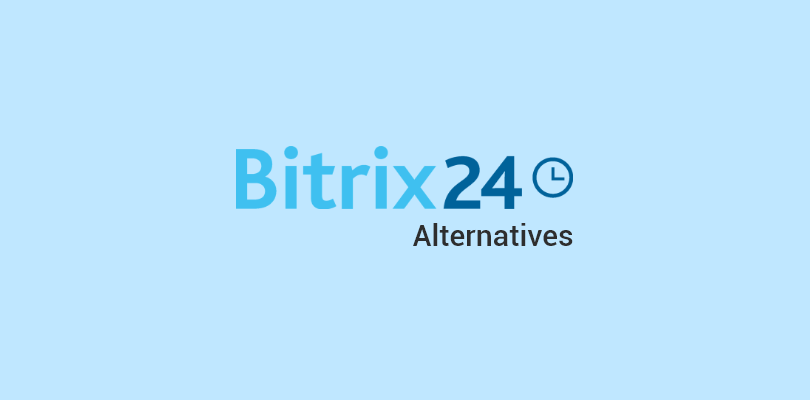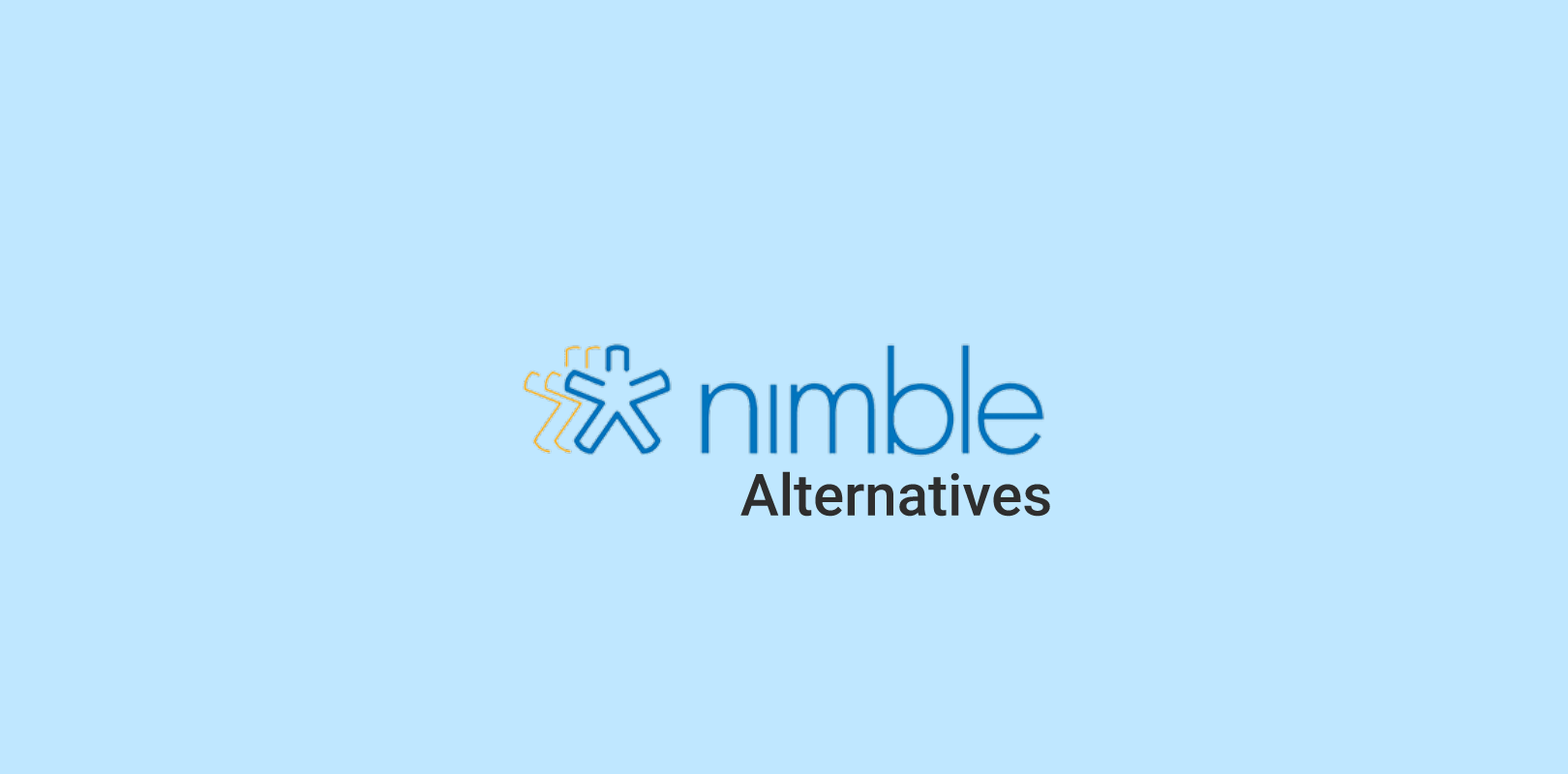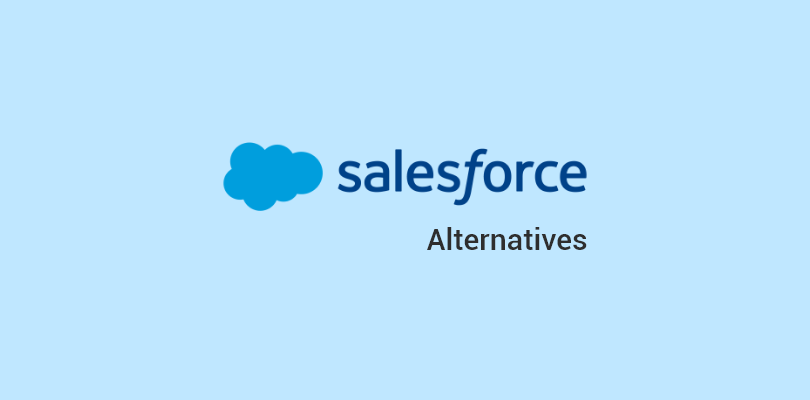While Zoho CRM often gains attention with its broad suite of features, certain drawbacks, such as ineffective workflows and clunky user interface, can make it a less-than-perfect fit for some businesses.
If you’ve found that the tool’s shortcomings outweigh its advantages for your specific needs and are looking for Zoho CRM alternatives, you’re in the right place.
Which Is the Best Zoho CRM Alternative?
When it comes to choosing a CRM that befits your organization’s needs best, considering alternatives to Zoho CRM, three potential contenders emerge:
Option A – BIGContacts
BIGContacts provides a complete view of customer interactions, integrated email marketing, and excellent task management. It suits agile businesses seeking a simplified, manageable CRM with a strong emphasis on contact and task management.
Option B – Keap
Keap offers a robust all-in-one CRM platform. It impressively aligns sales and marketing activities with its automation capabilities. Ideal for businesses looking to consolidate CRM, sales, and marketing operations.
Option C – SuiteCRM
SuiteCRM stands strong with its customizable features, robust reporting capabilities, and the unique SuiteASSURED program. It’s an excellent choice for businesses seeking a cost-effective, open-source CRM solution that allows extensive customization and integration.
However, the ‘best’ CRM depends on your specific business needs, the CRM’s ability to scale as you grow, and how well it integrates with your existing systems. Therefore, all three options have their strengths and should be evaluated in-depth based on your unique requirements.
List of Zoho CRM Alternatives
When choosing the best alternatives to Zoho CRM, I prioritized essential features like contact and lead management, sales tracking, customization, automation capabilities, etc., for a fair and comprehensive comparison.
I also examined the reputation of each software by assessing user reviews and industry ratings. Lastly, I took into account their popularity among businesses of various sizes and sectors, as well as personal recommendations and experiences shared by industry peers.
1. BIGContacts– Best Contact Management & Marketing Automation Solution for SMBs & Startups
I’ve tried various CRM and contact management tool, and to me, BIGContacts especially stood out as an excellent Zoho CRM alternative that keeps all contact data organized and accessible on the go.
With its user-friendly interface designed for small businesses, creating meaningful connections with clients becomes easier. The smart automation of tasks and reminders keeps our team proactive and systematic in managing responsibilities.
In my experience, the 360-degree view of all organized contacts and related activities makes it genuinely efficient. Plus, its flexible sales pipeline management and personalized drip email marketing campaigns help boost our conversion rates.
All in all, it’s a cost-effective solution that caters specifically to small businesses without compromising on features or support, proving to be a cost-effective choice.
What You’ll Like:
- Advanced contact search and segmentation capabilities
- Effective task management with color-coded priorities
- Integration with popular tools like MailChimp, Google Contacts, and Outlook
- Mobile access to manage contacts on the go
- Customizable webforms to effortlessly capture new contacts
What You May Not Like:
- Navigating through a vast range of email templates can be time-consuming
- Frequent software updates, although highly beneficial, may require you to adapt
Pricing:
- Forever free plan for startups with 100 contacts. Paid starts at $9.99/month with a 15-day free trial.
2. Agile CRM– Best for Unified Sales, Marketing & Support
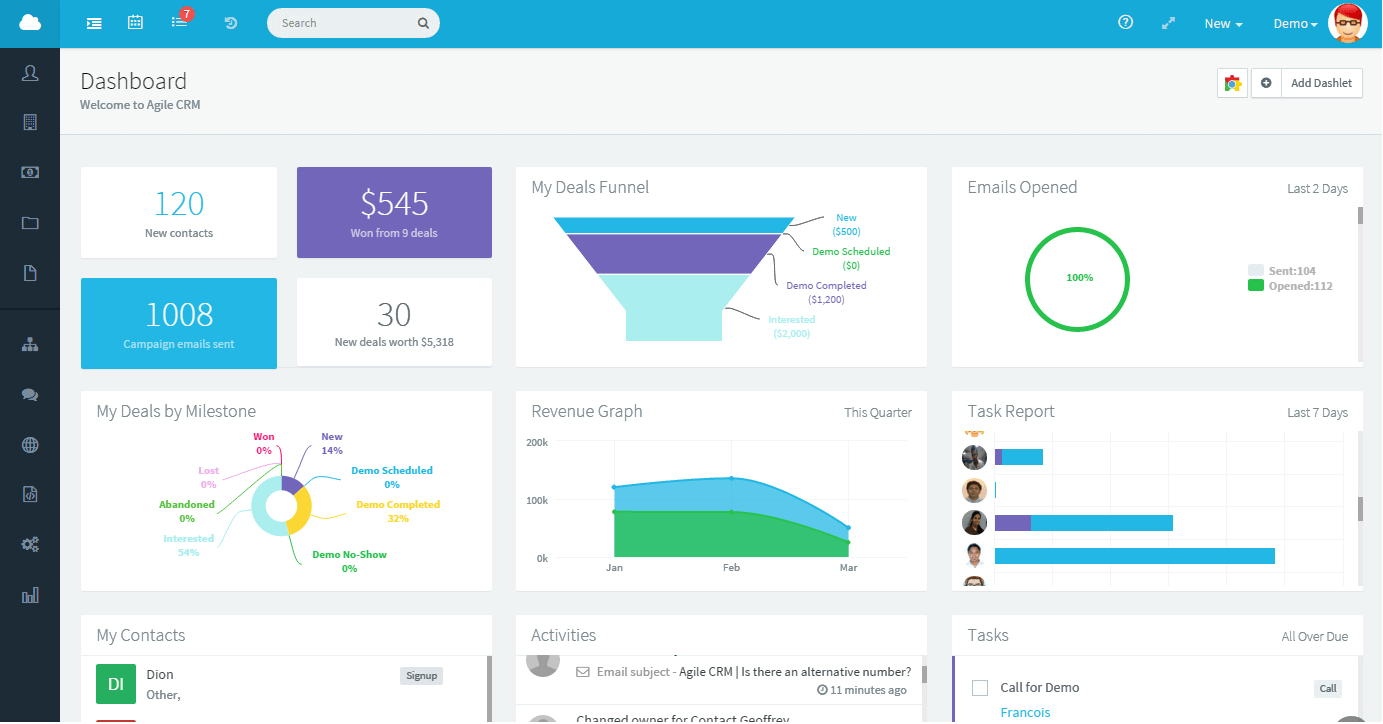
Image Source: Agile CRM
Agile CRM combines sales, marketing, and customer service efforts into one seamless platform, making it a comprehensive CRM system.
Personally, I love how its unified dashboard simplifies the processes and enhances cross-functional transparency. It also helps avoid data leaks and keeps everyone on the same page.
One compelling feature I’ve found is Agile CRM’s telephony. It allows for seamless one-click calling, call recording, and even voicemail automation. This feature helped automate our business interactions, substantially increasing our outreach and sales conversions, unlike anything Zoho CRM could offer.
What You’ll Like:
- Integrated project management with drag-and-drop task listings
- Gamification features add a competitive edge to sales performance
- Extensive email marketing with A/B testing and analytics
- Comprehensive landing page builder with numerous templates
- Capabilities for robust workflow and campaign automation
What You May Not Like:
- Some users have expressed concerns about slow customer support response times
- Limited third-party integrations could hinder efficient workflows
Pricing:
- Free for 10 users with 50,000 contacts. Paid options start at $9.99/user/month.
3. HubSpot– Best CRM for Email Marketing
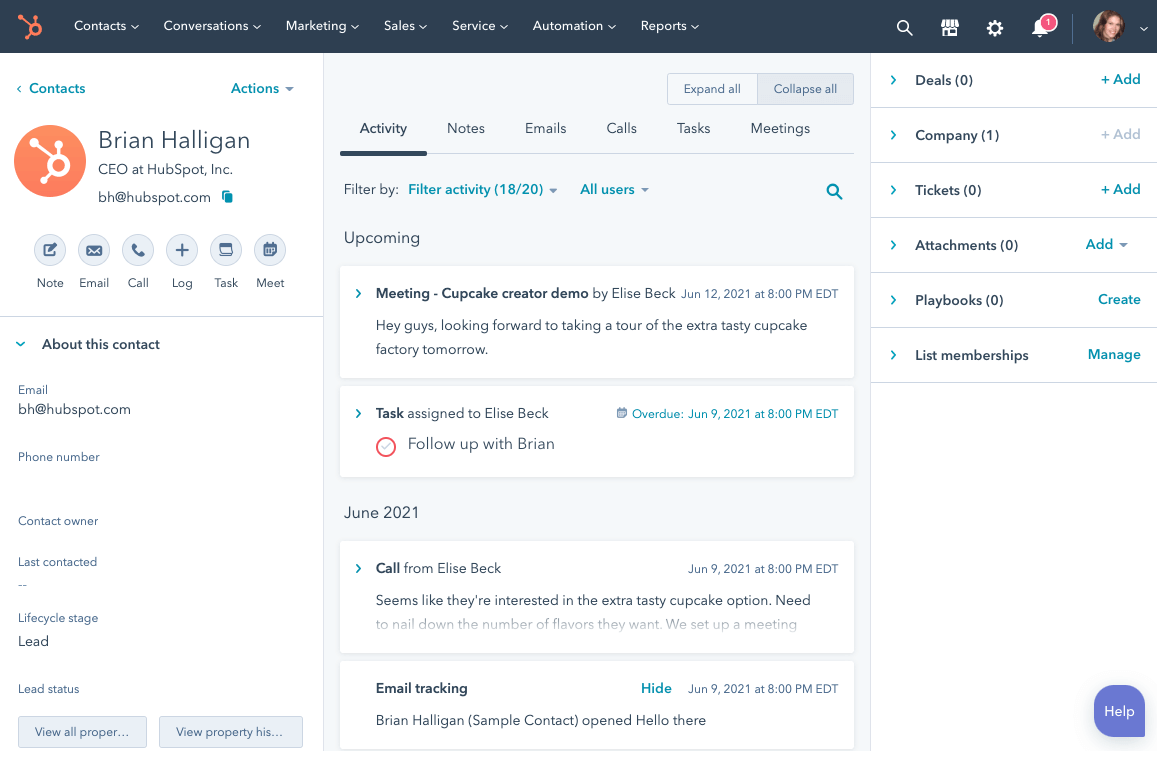
Image Source: HubSpot
Among the multitude of Zoho CRM alternatives, HubSpot CRM distinguishes itself through its range of potent, feature-rich offerings. Its standout capability, email marketing, gave us the ability to execute systematic, data-driven campaigns tailored to our audiences.
User-friendly templates coupled with advanced personalization tools ensure every email sent deeply resonates with the target audience, and the resulting metrics provide an unmatched understanding of campaign effectiveness.
Moreover, HubSpot CRM integrates brilliantly with Gmail and Outlook, further simplifying tracking and conversion processes – a leap ahead in CRM experience compared to Zoho CRM.
What You’ll Like:
- Ad management tools and landing page builder for increased conversions
- Detailed web analytics for comprehensive website performance reports
- Social media management feature for a diversified online presence
- Customizable sales and service dashboards to track key business metrics
- HubSpot Academy offers educational resources to enhance CRM skills
What You May Not Like:
- Users find the prices for add-ons or higher-tier plans notably expensive
- Advanced, customizable reports are available only in higher-priced plans
Pricing:
- Starts at $20/user/month.
4. Nimble– Best CRM for Gmail & Outlook Integration
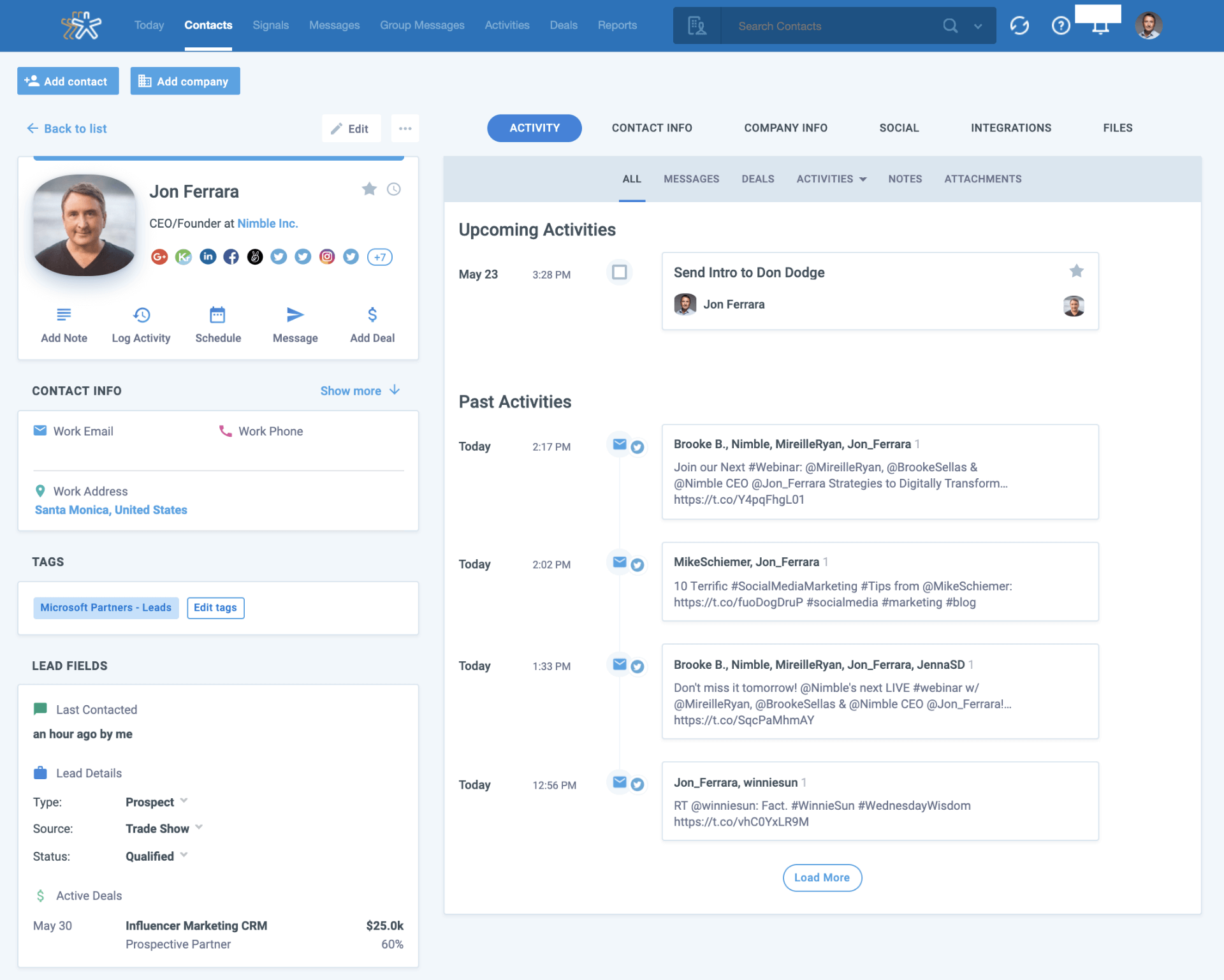
Image Source: Nimble
Nimble’s winning feature is its seamless synchronicity with Gmail and Outlook. It aligns perfectly with these popular email servers, enabling users to manage contacts, activities, insights, and emails in one unified platform.
I was able to handle a substantial amount of customer relations work without leaving the inbox. The platform is, therefore, highly effective for heavily email-reliant teams.
Another feature I liked about this simple Zoho alternative was the ability to capture leads using web forms. Adding to that, all the information related to contacts and team activities can be viewed using customizable dashboards, making the entire customer relationship management process simpler.
What You’ll Like:
- Offers comprehensive prospecting and contact management features for individuals and teams
- Provides enriched customer profiles by integrating social media data
- Works directly within social media networks and web browsers, enabling efficient contact management
- Workflows and automation streamline repetitive tasks across departments
- Offers tools for mass email communications accompanied by detailed performance tracking
What You May Not Like:
- Users mention limited mobile app functionality when comparing it to the desktop version
- Nimble CRM’s reporting tools can be unsophisticated for businesses with advanced analytical needs
Pricing:
- Starts at $24.90/user/month.
5. Keap– Best for Automation
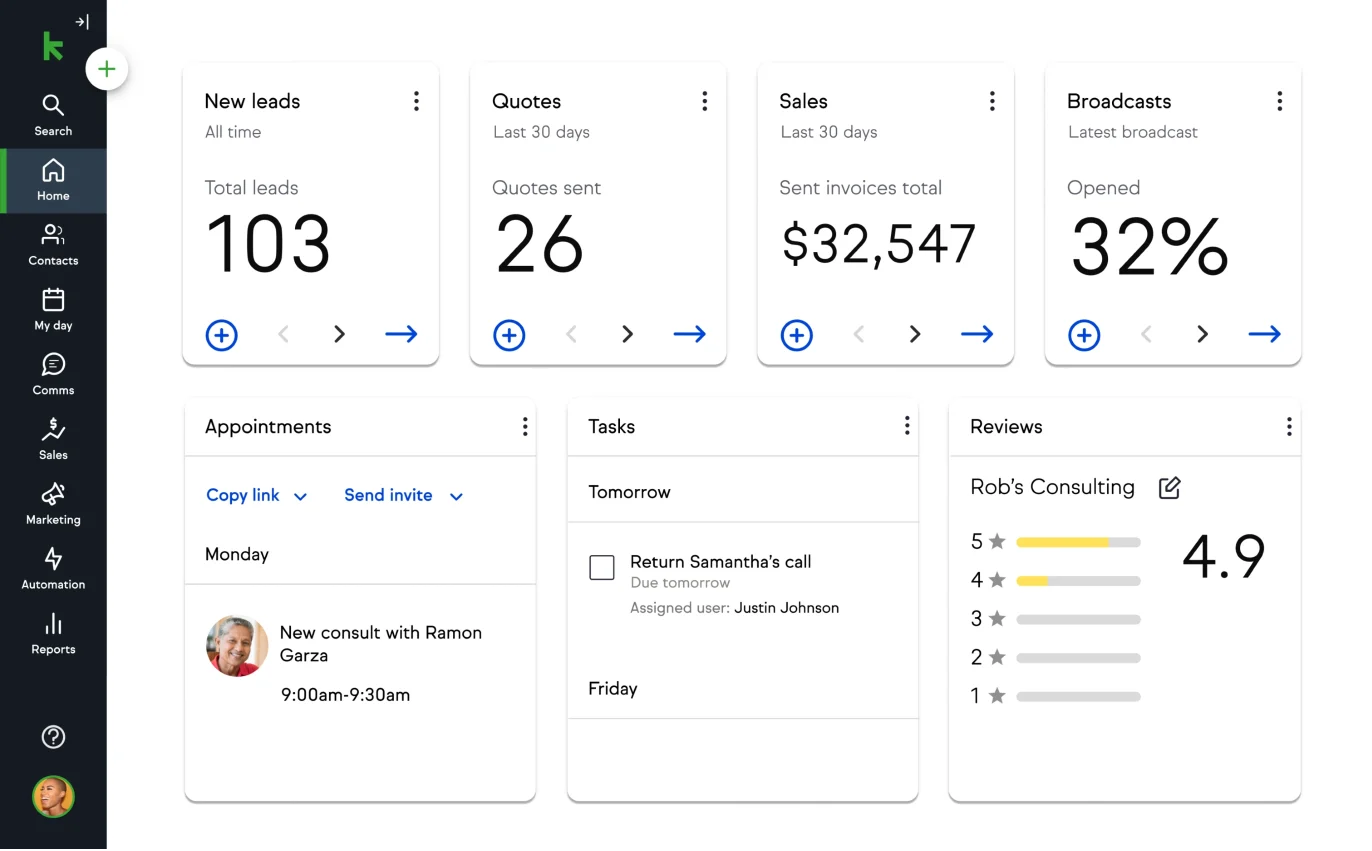
Image Source: Keap
As a former user, one aspect that impressed me about Keap was its small business automation capabilities. Keap enabled me to automate tedious tasks, which saved significant time and simplified scaling efforts.
Keap’s automation doesn’t just stop at the operational level; it extends to marketing and sales as well.
The automation offered ease of use for follow-ups with my leads, converting and upselling clients, and sending out personalized broadcast emails.
With Keap, I successfully managed to stay focused on core business activities while allowing the CRM tool to handle the busy work, ensuring the messages sent still sounded and converted exactly like how I would have done manually – an advancement I could not achieve with Zoho CRM.
What You’ll Like:
- Collects, organizes, and handles new leads with minimum manual effort with landing pages & pages
- Curated templates to create compelling emails and texts
- Keap business line ensures your business and personal conversations remain separate
- Reports & dashboards for effective sales forecasting and business performance tracking
- One-on-one coaching, 24/7 support, and seamless migration services
What You May Not Like:
- Pricing lies on the higher end compared to alternatives with similar functionalities.
- Some users have reported complications with invoicing functionality
Pricing:
- Starts at $159/month.
Read More: Lead Generation Through CRM Software: Everything You Need to Know
6. EngageBay– Best for Task Tracking & Automation
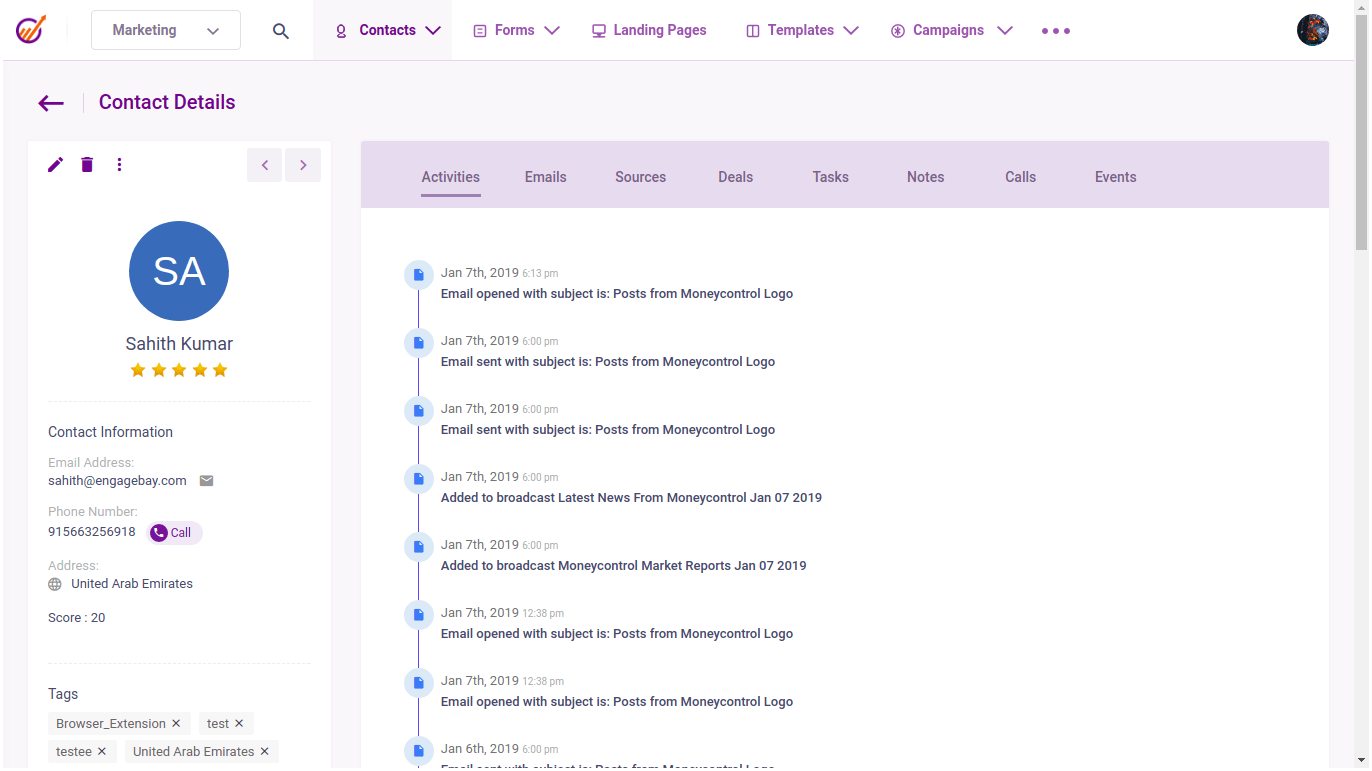
Image Source: EngageBay
One striking aspect of EngageBay is how it places task and appointment management on autopilot, offering the ability to receive and place calls directly from the CRM, enhancing productivity and reducing administrative workload.
You can use EngageBay to sync your mailboxes, assign tasks to team members, and share information across teams easily. It can help sales and marketing teams collaborate to get access to better leads and convert them into customers.
I also like the direct calling feature, which reduces the need for multiple tools, thereby saving time and consolidating data.
The capability of creating multiple deal pipelines is impressive as well. This allows users to categorize pipelines based on product categories, geographies, or any other suitable parameter, paving the way for easy monitoring of sales tasks.
What You’ll Like:
- A comprehensive view of every interaction with your leads for simplified contact organization
- Task management and appointment scheduling enhance efficiency
- Gamification motivates your sales team with published leaderboards and rewards
- Real-time data insights on proposal visits, downloads, click-through rates, and more
- Provides the tools for personalized and targeted marketing campaigns
What You May Not Like:
- Limited third-party integrations are an area of concern for some users
- You may experience difficulties performing advanced tasks or managing more intricate campaigns
Pricing:
- Free for up to 250 contacts. Paid options start at $13.79/user/month.
Read More: 8 Best EngageBay CRM Alternatives
7. Nutshell– Best for Sales Automation
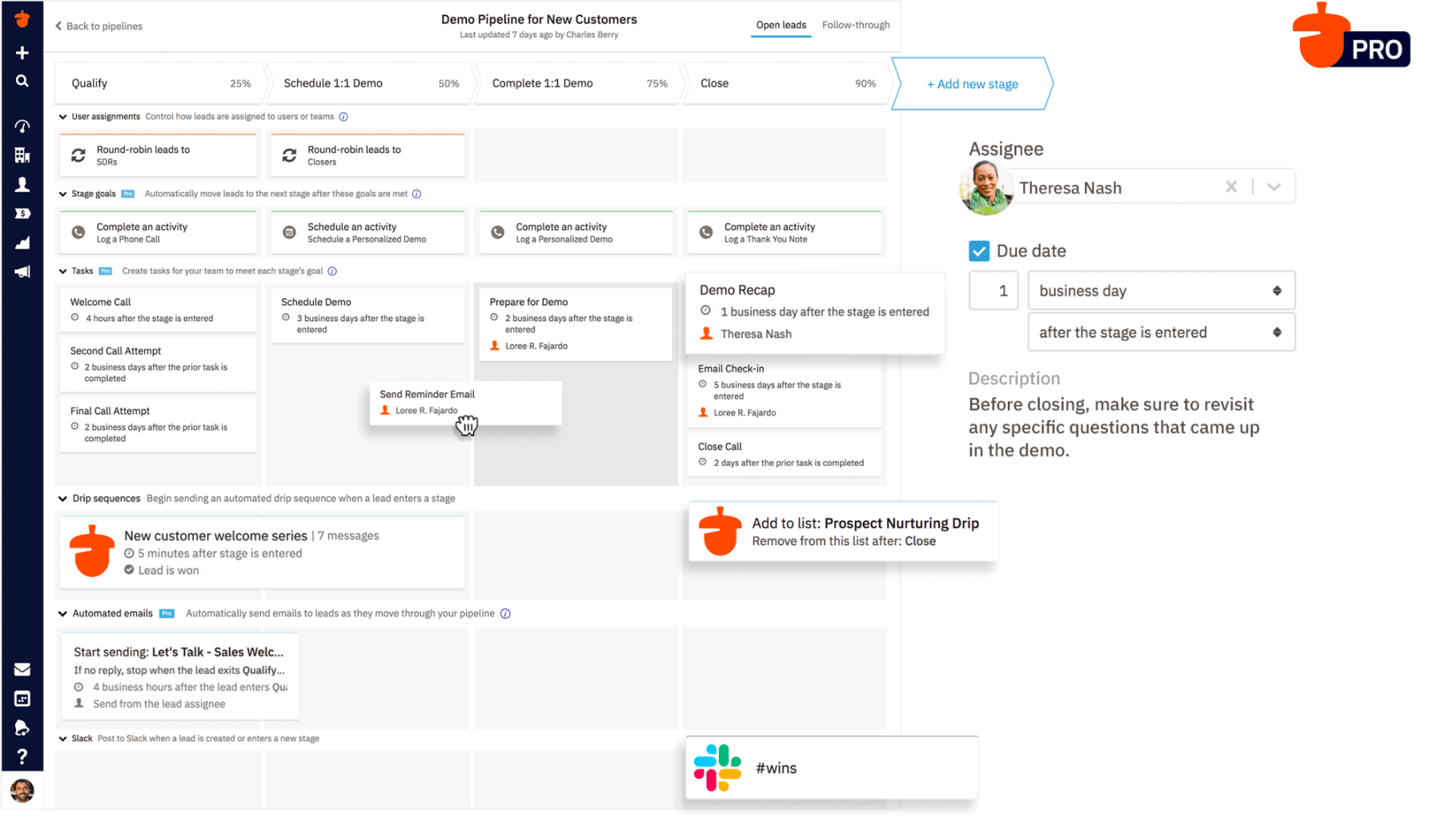
Image Source: Nutshell
From my past experience using Nutshell, I can attest to its impressive automation capabilities that made all the difference in managing my sales process.
Nutshell shines in areas like automatic lead assignment, lead advancement, and task reminders, reducing manual work and allowing businesses to focus on genuine relationship-building.
During my time with Nutshell, I particularly appreciated the personal email sequences feature, which automated our sales outreach while maintaining a highly personalized feel.
The platform’s pipeline management and easy-to-use analytics helped me gain insights into what worked and what needed adjustments, providing a high level of visibility into our sales performance.
What You’ll Like:
- Comprehensive contact management for quick access to vital customer data
- Web form integration to effortlessly capture customer information and create new leads
- Full-featured mobile apps, including a business card scanner for easy lead collection
- Seamless integration with Google Workspace, Microsoft Office, and other apps via Zapier
- Customizable sales reports and analytics for data-driven decision-making
What You May Not Like:
- Initially, you might need additional time to understand and utilize the CRM fully
- Some users have reported inadequate customizations for specific industries or use cases
Pricing:
- Starts at $16/month for up to 2 teams and 1 sales pipeline.
8. SuiteCRM– Best for Open Source CRM
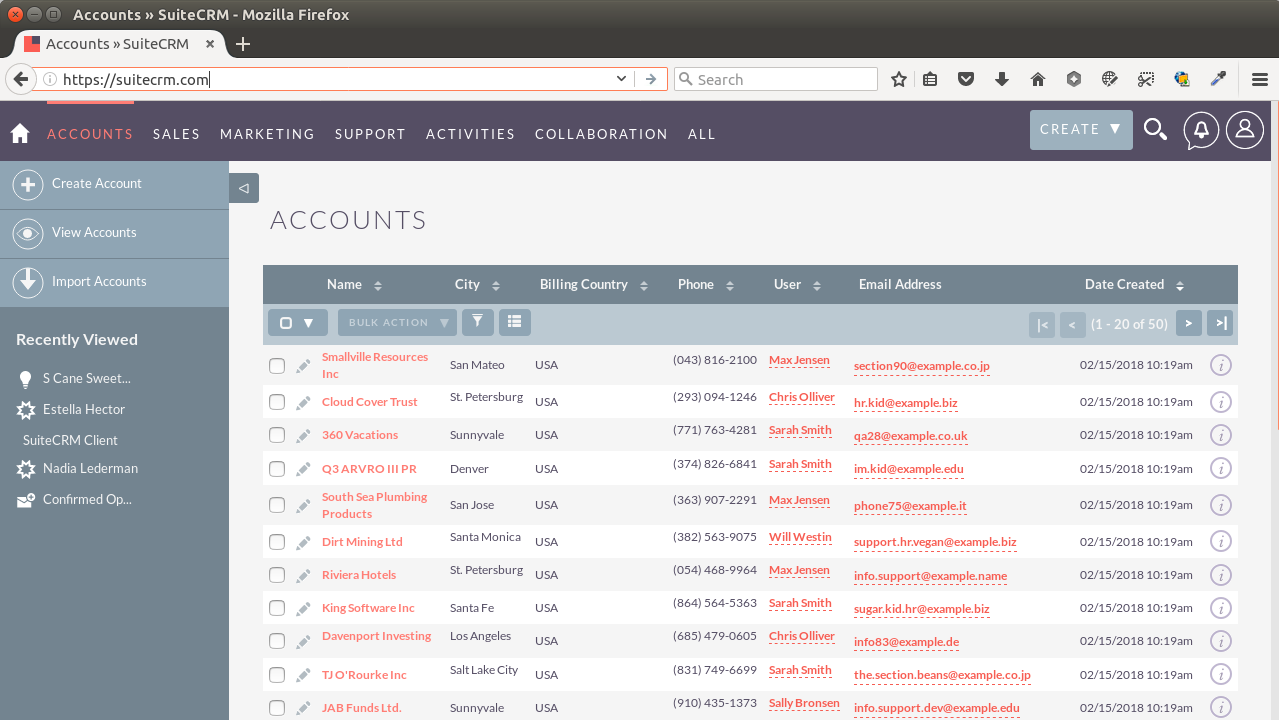
Image Source: SuiteCRM
The open-source CRM software solution is known for providing a 360-degree view of customers.
SuiteCRM’s customization capabilities allowed my team to create a central repository for all our customer data, enabling us to gain key insights that we used to enhance our business relationships.
Automation of significant actions was also made possible. Plus, powerful reporting ensured that we always had quick visibility of the key metrics.
SuiteCRM’s REST API opens up productivity across an organization, enabling the integration of CRM with core business systems, an intuitive feature that helps promote collaboration.
But perhaps one of SuiteCRM’s most powerful and distinguishing features is its ‘SuiteASSURED’ program. Providing warranties and indemnities of proprietary software with the innovation of open-source CRM, it is indeed the world’s first assurance program for open-source CRM systems.
What You’ll Like:
- Controlling data access based on user roles, making collaboration secure and efficient
- Integrated with tools for email campaigns, survey management, and marketing analytics
- A flexible data model allows for a single tailored repository for all customer data
- Utilizes rich customer profiles to convert more leads and facilitate sales
- An open API permits SuiteCRM to integrate seamlessly with third-party applications
What You May Not Like:
- Requires a higher level of technical expertise to implement and customize effectively
- Some users report slow response times or difficulty accessing support for the open-source version
Pricing:
- Open-source platform. Paid hosting starts at £95/month
More Deals, Less Effort!
Automate sales processes and keep your pipeline moving smoothly.
Evaluation Criteria
The evaluation of products chosen for this article follows an unbiased, systematic approach that ensures a fair, insightful, and well-rounded review. This method employs six key factors:
- User Reviews / Ratings- Direct experiences from users, including ratings and feedback from reputable sites, provide a ground-level perspective. This feedback is critical in understanding overall satisfaction and potential problems.
- Essential Features & Functionality: The value of a product is ascertained by its core features and overall functionality. Through an in-depth exploration of these aspects, the practical usefulness and effectiveness of the tools are carefully evaluated.
- Ease of Use: The user-friendliness of a product or service is assessed, focusing on the design, interface, and navigation. This ensures a positive experience for users of all levels of expertise.
- Customer Support: The quality of customer support is examined, taking into account its efficiency and how well it supports users in different phases – setting up, addressing concerns, and resolving operational issues.
- Value for Money: Value for money is evaluated by comparing the quality, performance, and features. The goal is to help the reader understand whether they would be getting their money’s worth.
- Personal Experience / Expert’s Opinion or Favorites: This part of the evaluation criteria draws insightful observations from the personal experience of the writer and the opinions of industry experts.
FAQ
Why should a business look for Zoho competitors?
While Zoho CRM offers many features, it may not perfectly align with every business's specific needs or budget. Some businesses might find Zoho's suite complex or even overwhelming. At times, it may seem heavy for small-scale businesses looking for more straightforward, minimalistic CRM solutions that cater to their unique needs.
Cost-wise, businesses, especially startups and SMBs, might find Zoho's premium feature pricing steep and not conducive to their current financial situation. Integration with other software is important for seamless operations, so businesses may seek alternatives that better fit their tech stack.
How do I choose the best Zoho alternative?
Choosing the best Zoho alternative involves considering the software's ease of use, cost, potential integrations, credibility, scalability, and customer support.
Firstly, identify the specific CRM functionalities your business requires. Next, focus on finding a user-friendly and customizable option to streamline your process rather than complicate it. An effective CRM, like BIGContacts, embodies this quality, helping users easily navigate through its features.
Take into account the pricing of alternatives, ensuring they fit within your budget both now and for potential future upgrades. Check if the CRM can integrate seamlessly with your existing software stack.
Lastly, do a background check for the CRM's credibility through customer reviews and industry reputation. Moreover, spotting a CRM with sound customer support, much like BIGContacts, will provide reliable assistance whenever needed.
Weaving in all these factors will help you land on the ideal CRM alternative, maximizing your business's productivity and efficiency.
For more on this, watch:
How do I transfer data from Zoho to another CRM?
- Export Data from Zoho: In Zoho, go to 'Settings', then 'Data Administration', and select 'Export.' Choose the modules you want to export, and download the data as a CSV or XLS file.
- Import Data To New CRM: Log into your new CRM and import the data. If you're using a system like BIGContacts, importing data is made easier with intuitive import templates.
Remember, always back up your data before starting the migration process. Also, check the imported data to ensure successful transfer.
FREE. All Features. FOREVER!
Try our Forever FREE account with all premium features!



